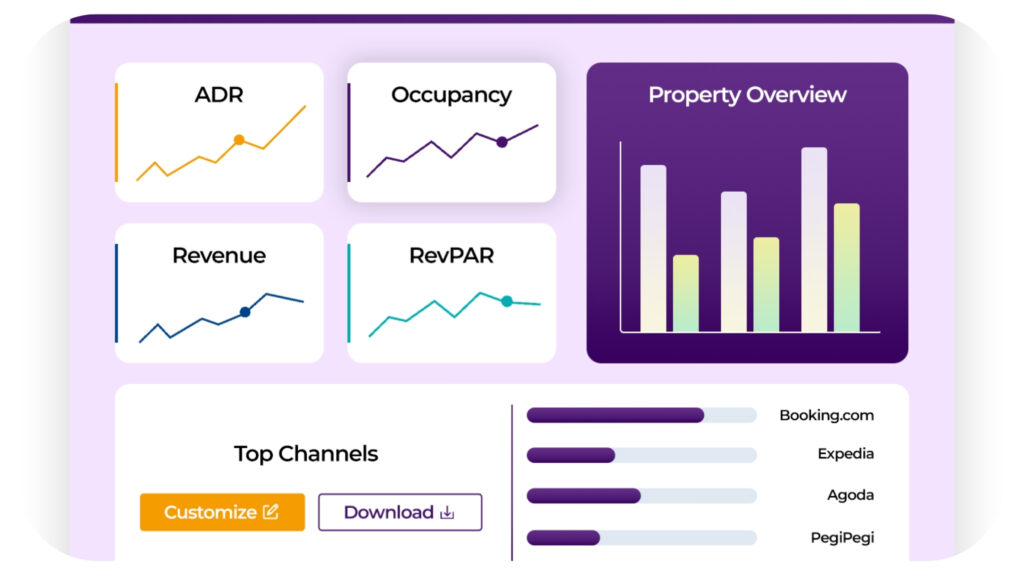Optimizing Pricing Strategies: Dynamic Pricing and Rate Management with Booking Engine Channel Managers
This post was last updated on January 4th, 2025

In hospitality, pricing strategies can make or break a hotel’s bottom line. With the advent of technology, hoteliers now have access to powerful tools like a booking engine channel manager that can revolutionize how they manage rates and maximize revenue. Dynamic pricing can significantly boost profitability and occupancy rates with effective rate management through these channel managers.
So, delve into how hoteliers can optimize their strategies with dynamic pricing and rate management using these managers.
1. Leveraging Data Insights
One of the key advantages of these managers is their ability to gather and analyze vast amounts of data in real-time. Hoteliers can leverage these insights to understand market trends, competitor strategies, and guest booking behaviors. By tapping into this wealth of information, they can make informed decisions when setting their rates dynamically. This includes analyzing historical booking data and monitoring social media trends, local events, and economic indicators that may impact demand. Transitioning seamlessly between high and low-demand periods becomes more manageable when armed with comprehensive, data-driven insights.
2. Personalizing Offers
Personalization is paramount. A booking engine channel manager enables hoteliers to tailor pricing and offers based on past guest behavior, demographics, and browsing history. This level of personalization can enhance guest satisfaction and loyalty while driving revenue growth. Transitioning from a one-size-fits-all approach to a personalized strategy involves understanding guest preferences and segmenting the target audience to deliver targeted promotions and packages. By offering customized experiences, they can create a sense of exclusivity and value for guests, leading to better brand loyalty and positive word-of-mouth referrals.
3. Implementing Dynamic Pricing
Dynamic pricing, facilitated by these managers, allows them to adjust rates in real-time based on demand fluctuations, inventory levels, and other market dynamics. This agile approach ensures that hotels are always charging optimally to maximize revenue. By leveraging dynamic algorithms, hoteliers can strike the perfect balance between supply and demand, avoiding overbooking during peak seasons and maximizing occupancy during slower periods. Additionally, it enables hotels to capitalize on last-minute bookings and sudden changes in demand, maximizing revenue potential without sacrificing profitability. Transitioning to this model requires adopting the right technology and training staff to understand and implement pricing strategies effectively.
4. Streamlining Distribution Channels
These managers streamline the distribution process by enabling hotels to manage multiple online channels from a single platform. This centralized approach ensures rate parity across all channels while minimizing the risk of overbooking or underselling inventory. Transitioning to a unified distribution strategy saves resources and ensures consistent charging and availability across all platforms, enhancing the guest booking experience. By consolidating distribution channels, hotels can gain better control over their inventory and pricing, reducing the likelihood of rate disparities and discrepancies.
5. Monitoring and Optimization
Continuous monitoring and optimization are crucial for the success of any strategy. These managers provide hoteliers with robust reporting tools and performance metrics to monitor the efficacy of their approach in real-time. By closely monitoring key metrics such as RevPAR and ADR (Average Daily Rate), hoteliers can identify areas for improvement and make data-driven adjustments accordingly. Transitioning from static models to dynamic, data-driven strategies requires ongoing refinement and optimization to stay ahead of the competition. This involves analyzing performance metrics, soliciting guest feedback, and monitoring market trends to anticipate changes in demand and adjust pricing strategies accordingly.
Mastering pricing strategies is essential for hoteliers looking to thrive in a dynamic market landscape. By harnessing the power of dynamic pricing and effective rate management with a booking engine channel manager, hotels can unlock new revenue growth levels, optimize occupancy rates, and enhance the guest booking experience. Transitioning from traditional pricing models to data-driven, personalized strategies can position hotels for long-term success in an ever-evolving industry.
Recommended For You
Using Social Media to Increase Your Product’s Desirability
Most Inside
Most Inside offers high-quality recommendations and valuable updates to enhance all aspects of your life, providing premium guidance and enriching experiences.




